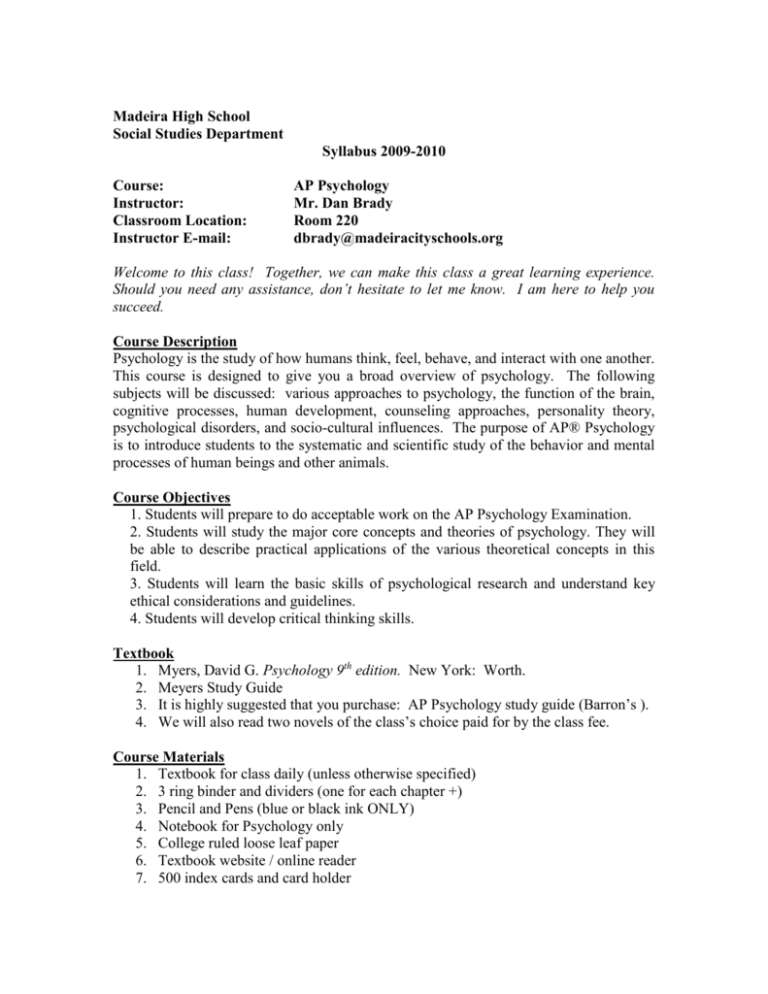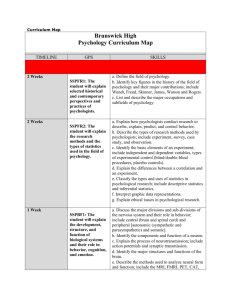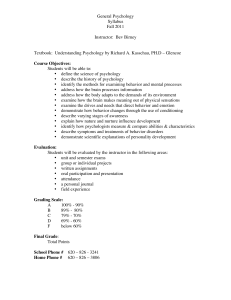AP Psychology Syllabus
advertisement

Madeira High School Social Studies Department Syllabus 2009-2010 Course: Instructor: Classroom Location: Instructor E-mail: AP Psychology Mr. Dan Brady Room 220 dbrady@madeiracityschools.org Welcome to this class! Together, we can make this class a great learning experience. Should you need any assistance, don’t hesitate to let me know. I am here to help you succeed. Course Description Psychology is the study of how humans think, feel, behave, and interact with one another. This course is designed to give you a broad overview of psychology. The following subjects will be discussed: various approaches to psychology, the function of the brain, cognitive processes, human development, counseling approaches, personality theory, psychological disorders, and socio-cultural influences. The purpose of AP® Psychology is to introduce students to the systematic and scientific study of the behavior and mental processes of human beings and other animals. Course Objectives 1. Students will prepare to do acceptable work on the AP Psychology Examination. 2. Students will study the major core concepts and theories of psychology. They will be able to describe practical applications of the various theoretical concepts in this field. 3. Students will learn the basic skills of psychological research and understand key ethical considerations and guidelines. 4. Students will develop critical thinking skills. Textbook 1. Myers, David G. Psychology 9th edition. New York: Worth. 2. Meyers Study Guide 3. It is highly suggested that you purchase: AP Psychology study guide (Barron’s ). 4. We will also read two novels of the class’s choice paid for by the class fee. Course Materials 1. Textbook for class daily (unless otherwise specified) 2. 3 ring binder and dividers (one for each chapter +) 3. Pencil and Pens (blue or black ink ONLY) 4. Notebook for Psychology only 5. College ruled loose leaf paper 6. Textbook website / online reader 7. 500 index cards and card holder Additional material will be needed and requested throughout this course. Grading: 1. We will follow our district’s grading scale: A100-90 B89-80 C79-70 D69-60 F59 and below 2. Final grades will be determined based on the following: -50% Extended notice evaluations (tests, essay, journals, projects, research papers and presentations) -20% Quizzes -10% Classroom participation, meeting objectives, and life management skills -20% Assignments (homework, in-class work, etc.) 3. There will be opportunities to earn extra credit -We will discuss this when the opportunity is presented 4. In this course there will be one large research project that will be due at the end of the year. 5. Throughout the entire year you will be required to do article write-ups dealing with pertinent information that has been written in professional journals and magazines. Here are the requirements for this short essay: Article Write-Ups from any Professional sources including“Psychology Today” Each write up should be one-page in length type written/ double spaced/12 font. Your write up will include: The title of the article (the issue, author, and date) What the theme of the article entails ex. Dreams, Happiness, Creativity What you learned about the field of psychology from the article. Anything from the article that you may use in your own personal life. Make-Up Work and Late Work Policy: You will have the same number of days to make up your work as the number of excused days absent, plus two days. If your absence is unexcused you will be allowed to make up the work, but it must be turned in at the next instructional period. o If unexcused because of a discipline problem, the student will NOT be permitted to make up the assignment. Late work will be permitted on CERTAIN assignments until the weeks end but not for full credit. o We will discuss this further throughout the course. If a student has been absent, he/she must check the “Daily Absent Bins” when entering the classroom, for handouts and the class website (before entering the classroom) for any missed work. The student must then check with other students in the class for additional instructions. After a student has checked with other students, they then see the instructor for additional explanations, or materials. Code of Conduct: Students are responsible to familiarize themselves with and follow the Madeira High School Student Code of Conduct. Classroom Rules and Procedures 1. Be respectful of yourself, others, and the classroom 2. You must be prepared for each instructional period which includes being on time to class, having your materials, and an attitude fit for learning. -You are considered late if you are not in your seat when the bell rings. 3. Please raise your hand and wait to be called on for any student needs. -Do not get out of your seat at any time unless permission is granted by the instructor. 4. Electronic Devices are not permitted in the classroom 5. No sleeping in class – unless hypnotized!! 6. Talking while I am instructing or during certain activities will not be permitted. -Please listen at all times. 7. No food or drink in the classroom (water will be allowed). 8. Calmly enter the room, go to your assigned seat, and check the board for the day’s work. 9. Be sure to clean up your workspace, the floor, and return any materials you may have used in their proper place. 10. All students must be quiet and in their seats before they will be dismissed! Procedures, Expectations, and Rules will be implemented throughout this course. Under my discretion, I have the authority to change anything concerning this course. COURSE OUTLINE: History, Approaches and Research Methods (3 weeks) Introduction and Chapter 1 Objectives • Define psychology and trace its historical development. • Compare and contrast the psychological perspectives. • Identify basic and applied research subfields of psychology. • Identify basic elements of an experiment (variables, groups, sampling, population, etc.). • Compare and contrast research methods (case, survey, naturalistic observation). • Explain correlational studies. • Describe the three measures of central tendency and measures of variation. • Discuss the ethics of animal and human research. Biological Basis of Behavior (3 weeks) Chapter 2 Objectives • Describe the structure of a neuron and explain neural impulses. • Describe neuron communication and discuss the impact of neurotransmitters. • Classify and explain major divisions of the nervous system. • Describe the functions of the brain structures (thalamus, cerebellum, limbic system, etc.). • Identify the four lobes of the cerebral cortex and their functions. • Discuss the association areas. • Explain the split-brain studies. • Describe the nature of the endocrine system and its interaction with the nervous system. States of Consciousness (2 weeks) Chapter 3 Objectives • Describe the cyclical nature and possible functions of sleep. • Identify the major sleep disorders. • Discuss the content and possible functions of dreams. • Discuss hypnosis, noting the behavior of hypnotized people and claims regarding its uses. • Discuss the nature of drug dependence. • Chart names and effects of depressants, stimulants, and hallucinogenic drugs. • Compare differences between NREM and REM. • Describe the physiological and psychological effects of depressants, stimulants, and hallucinogens. Sensation & Perception (2 weeks) Chapter 6 Objectives • Contrast the processes of sensation and perception. • Distinguish between absolute and difference thresholds. • Label a diagram of the parts of the eye and ear. • Describe the operation of the sensory systems (five senses). • Explain the Young-Helmholtz and opponent-process theories of color vision. • Explain the place and frequency theories of pitch perception. • Discuss Gestalt psychology’s contribution to our understanding of perception. • Discuss research on depth perception and cues. Learning (2 weeks) Chapter 8 Objectives • Describe the process of classical conditioning (Pavlov’s experiments). • Explain the processes of acquisition, extinction, spontaneous recovery, generalization, and discrimination. • Describe the process of operant conditioning, including the procedure of shaping, as demonstrated by Skinner’s experiments. • Identify the different types of reinforcers and describe the schedules of reinforcement. • Discuss the importance of cognitive processes and biological predispositions in conditioning. • Discuss the effects of punishment on behavior. • Describe the process of observational learning (Bandura’s experiments). Memory (2 weeks) Chapter 9 Objectives • Describe memory in terms of information processing, and distinguish among sensory memory, short-term memory, and long-term memory. • Distinguish between automatic and effortful processing. • Explain the encoding process (including imagery, organization, etc.). • Describe the capacity and duration of long-term memory. • Distinguish between implicit and explicit memory. • Describe the importance of retrieval cues. Thinking and Language (2 weeks) Chapter 10 Objectives • Describe the nature of concepts and the role of prototypes in concept formation. • Discuss how we use trial and error, algorithms, heuristics, and insight to solve problems. • Explain how the representativeness and availability heuristics influence our judgments. • Describe the structure of language (phonemes, morphemes, grammar). • Identify language developmental stages (babbling, one word, etc.). • Explain how the nature-nurture debate is illustrated in the theories of language development. • Discuss Whorf’s linguistic relativity hypothesis. • Describe the research on animal cognition and communication. Testing and Individual Differences (2 weeks) Chapter 11 Objectives • Trace the origins of intelligence testing. • Describe the nature of intelligence. • Identify the factors associated with creativity. • Distinguish between aptitude and achievement tests. • Describe test standardization. • Distinguish between the reliability and validity of intelligence tests. • Describe the two extremes of the normal distribution of intelligence. • Discuss evidence for both genetic and environmental influences on intelligence. • Discuss whether intelligence tests are culturally biased. Motivation and Emotion (2 weeks) Chapters 12 and 13 Objectives • Define motivation and identify motivational theories. • Describe the physiological determinants of hunger. • Discuss psychological and cultural influences on hunger. • Define achievement motivation, including intrinsic and extrinsic motivation. • Identify the three theories of emotion (James-Lange, Cannon-Bard, Schachter-Singer). • Describe the physiological changes that occur during emotional/sexual arousal. • Discuss the catharsis hypothesis. • Describe the biological response to stress. Developmental Psychology (2 weeks) Chapter 4 Objectives • Discuss the course of prenatal development. • Illustrate development changes in physical, social, and cognitive areas. • Discuss the effect of body contact, familiarity, and responsive parenting on attachments. • Describe the benefits of a secure attachment and the impact of parental neglect and separation as well as day care on childhood development. • Describe the theories of Piaget, Erikson, and Kohlberg. • Describe the early development of a self-concept. • Distinguish between longitudinal and cross-sectional studies. Personality (3 weeks) Chapter 14 Objectives • Describe personality structure in terms of the interactions of the id, ego, and superego. • Explain how defense mechanisms protect the individual from anxiety. • Describe the contributions of the neo-Freudians. • Explain how personality inventories are used to assess traits. • Describe the humanistic perspective on personality in terms of Maslow’s focus on selfactualization and Rogers’ emphasis on people’s potential for growth. • Describe the impact of individualism and collectivism on self-identity. • Describe the social-cognitive perspective on personality. • Discuss the consequences of personal control, learned helplessness, and optimism. Stress (2 weeks) Chapter 17 Objectives: Describe the General Adaptation Syndrome. Compare and contrast various forms of stress. Explain how personality type influences a person’s response to stress. Describe the negative impact of stress on one’s psychological and physical well-being. Abnormal Psychology (3 weeks) Chapter 14 Objectives • Identify the criteria for judging whether behavior is psychologically disordered. • Describe the medical model of psychological disorders. • Describe the aims of DSM-IV, and discuss the potential dangers of diagnostic labels. • Describe the symptoms of generalized anxiety disorder, phobias, obsessive-compulsive disorder, and posttraumatic stress disorder. • Describe and explain the development of somatoform and mood disorders. • Describe the various symptoms and types of schizophrenia. • Describe the nature of organic and personality disorders. • Describe the characteristics and possible causes of dissociative disorders. Treatment of Psychological Disorders (2 weeks) Chapters 15 and 16 Objectives • Discuss the aims and methods of psychoanalysis. • Identify the basic characteristics of the humanistic therapies. • Identify the basic assumptions of behavior therapy. • Describe the assumptions and goals of the cognitive therapies. • Discuss the benefits of group therapy and family therapy. • Discuss the findings regarding the effectiveness of the psychotherapies. • Discuss the role of values and cultural differences in the therapeutic process. • Identify the common forms of drug therapy and the use of electroconvulsive therapy. Social Psychology (2 weeks) Chapter 18 Objectives • Describe the importance of attribution in social behavior. • Explain the effect of role-playing on attitudes in terms of cognitive dissonance theory. • Discuss the results of Asch’s experiment on conformity. • Describe Milgram’s controversial experiments on obedience. • Discuss how group interaction can facilitate group polarization and groupthink. • Describe the social, emotional, and cognitive factors that contribute to the persistence of cultural, ethnic, and gender prejudice and discrimination. • Discuss the issues related to aggression and attraction. • Explain altruistic behavior in terms of social exchange theory and social norms. AP Psychology Syllabus Acknowledgement Form o Please fill out the following information and return by August 20th. Printed Student’s Name: ________________________________ Student Signature: ______________________________________ Period: _________________ Date: __________________ o Please sign below to indicate that you have read our class syllabus. Printed Guardian Name:____________________________________ Guardian Signature:________________________________________ Date: ___________________ Email Address _____________________________________________________ Please print clearly Guardians, if you have any questions based on this syllabus please e-mail me at dbrady@madeiracityschools.org Thank you, Mr. Dan Brady Instructor





